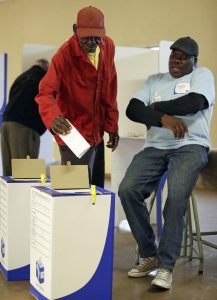
Umm Muhammed Umar
South Africans have become less and less inclined to vote over the last few elections. As the country’s economy went into a downward spiral, with corruption and state capture escalating, it seems South Africans might have become on the verge of giving up hope. Surveys and reports over the past month have indicated that voter numbers would again decrease in the November 1 local elections. ASRI’s Director of Strategy, Sabeeha Motala, shared insights with Radio Islam regarding whether voting should be made compulsory.
Motala said that that there was apathy within the electoral system, as well as those who believed that the party-based system didn’t serve its purpose anymore. There were also those who were giving into the status quo of corruption and maladministration in South Africa, which benefited a lot of people as it enabled them to circumvent the laws quite easily. She added that there was also a completely different playing field, where there was, now more than ever, a large number of independent candidates running in different wards. Motala said, “So, I think that we are in some unprecedented times, and possibly very unpredictable (as to) how these how these elections are going to turn out.”
22 countries have made voting mandatory. In those countries, the voter turnout is relatively high. For example, the voter turnout in the 2019 election in Australia was at 91%. Meanwhile, in Brazil, voting is compulsory, even for citizens that live abroad. Belgium also had a really high turnout of 85 to 95%, as compared to South Africa, where the voter turnout for the last national elections, in 2019, was at just 66%. Motala said that even in 1994, which was possibly the peak of South African voter optimism, the turnout was about 7%, lower than in some of the countries where voting is compulsory. However, one of the problems that could possibly accompany voting being made compulsory was the application of rules. Motala said, “If you have, for example 25% of the voting population that don’t turn up, how do you enforce a fine, or whatever the case may be, for those voters?” She questioned whether voter turnout would improve the democratic process, and give the government more legitimacy. Motala said, “That’s the big question. Would it force people to become more politically aware and develop a political opinion, if they’re now forced to exercise their vote?”
Further, turning up to vote, or not turning up to vote, was a political act in itself. It could demonstrate the rejection of the voting system, and of the government, and of the legitimacy of the means that we use to choose the government. Motala asked, “were then do we draw the line in terms of people exercising their political freedom?”
In the case of South Africa, the voting process may be sentimental – many people have died in the struggle, but their party associates and their friends and family still happen to be alive. Motala said that was an incredibly important aspect of South Africa. She said that that essentially was the legacy left behind by those who fought and died for our freedom to vote, adding, “it is indeed something that’s sort of drilled into South Africans of all ages from school all the way to, you know, the elderly.” She said, “that’s an important question – whether the way we honour that legacy and the sacrifice made by them, is to ensure that people do exercise the right to vote.” However, it can also be argued that those people fought and died for our right to exercise our political views in the way that we choose. This meant that not voting abstaining or even spoiling votes, was also indeed a political expression. The question now is whether the parties have honoured the system that put them in power, and whether it’s still appropriate for us to be, making use of that voting system, as change.







0 Comments